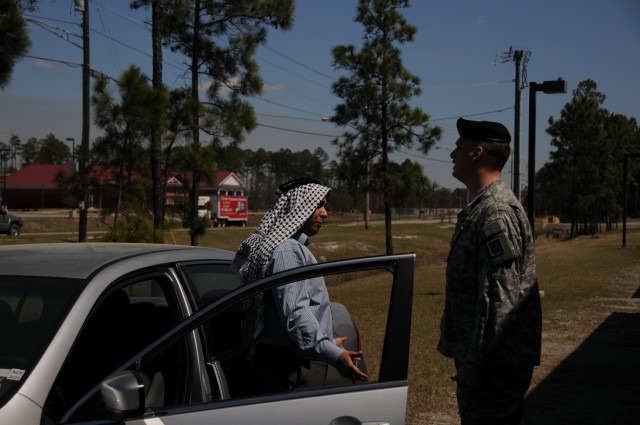
FORT STEWART, Ga. - The 3rd Infantry Division Language Training Facility is housed in two trailers across from the Spartan Dining Facility. But despite their temporary dwellings, what goes on in these trailers is some very important training that Soldiers can get before deploying overseas. In the LTF, Soldiers learn the language and customs of the countries they are deploying to.
The facility is run by Sgt. Paul Lucas, 3rd Infantry Division Special Troops Battalion, the noncommissioned officer in charge and facilitator of the LTF and an Arabic linguist. He teaches along with Hany Moussa, a native of Egypt who teaches modern standard Arabic, Iraqi dialect, Egyptian dialect and Arab culture. Sergeant Lucas teaches "Survival Iraqi," Iraqi cultural awareness, Afghani cultural awareness and use of an interpreter.
Both Sgt. Lucas and Moussa pointed out that most Soldiers don't have the time to become fluent in the language of the country they are deployed to, but that if you learn certain phrases, as well as the cultural sensitivities of the country, then you can be successful in your mission.
"If you don't have a translator available to you... if you know some of the phrases and know how to understand some of the phrases, you can survive," Sgt. Lucas told the 20 Soldiers who attended the Language and Culture Day, March 26. "You can learn some of the phrases that can save your life over there."
Sergeant Lucas and Moussa gave the Soldiers present at Language and Culture day a brief overview of what is offered at the LTF and then performed two mock scenarios for the audience. The first was a vehicle search with Sgt. Lucas as the U.S. Soldier and Moussa as the Iraqi national; the second was a home search. In both scenarios, the two spoke in only Arabic, and Sgt. Gaber Abouzeid, linguist with the National Ground Intelligence Center who is currently working out of the LTF, translated into English for the audience.
"We wanted to show them [the Soldiers] what our program entails, what we can offer Soldiers, and give them a little taste of the culture," Sgt. Lucas said. "Part of our goal is to get them back to the unit and tell their command that they want to come back. This facility is to be used by the Soldiers.
"Many Soldiers deploying need this language, in fact all of them do," he continued. "They need to learn the customs, the culture of traditions, and the language of the country they're going to."
After the scenarios, the LTF staff provided a taste of Arabic food for the 20 Soldiers in attendance, including tabouli, curried rice, chicken kabobs, hummus, tahini and baklava.
Specialist Charles Walker, Company B, 4-3 Brigade Special Troops Battalion, 4th Infantry Brigade Combat Team, attended the event, March 26. Specialist Walker is readying to head off to the National Training Center with his brigade, then deploy to Iraq. He said that his brigade was given a two-day culture class, but becoming more familiar with the language will help him in Iraq.
"I've been around and heard some Arabic, but just listening to the scenarios today really helped, seeing what we may have to deal with during the deployment," he said. "I'd really like to come back here to take the Iraqi survival course before I deploy."
One of the aspects that the LTF teaches everyone who enters the doors of the facility are the customs and culture of the country they are deploying to.
"(They) have to know why things are done the way they're done as not to offend anyone," said Sgt. Lucas, a 2006 graduate of the Defense Language Institute. "(For example) the treatment of women is very different in our culture; we stress this and make sure they understand it."
The facility also supports trained linguists, who are required to come in for four hours each week, Sgt. Lucas said. The LTC provides a full complement of programs and resources to help them stay proficient in the language.
"The main type [of Soldiers in the LTF] are linguists and intelligence field Soldiers who know they'll be having interaction with language," he said. But he also said there are classes for other Soldiers who want to learn the language and culture before they deploy.
"We've had Infantry Soldiers [come here] who have been deployed and were embarrassed that they didn't know the language, so they come here to learn some before their next deployment," Sgt. Lucas said.
Whether a linguist maintaining fluency or a Soldier about to deploy, the LTF is a place where Soldiers can get valuable training for their time overseas.
"I enjoy teaching the language to other Soldiers," Sgt. Lucas said. "Learning the language will make them a more prepared Soldier."

Social Sharing